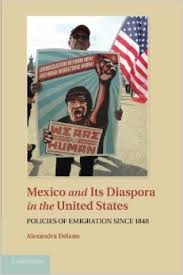Emigration & Immigration: Mexico and the United States
 Alexandra Delano, a professor at the New School, grounds her book Mexico and Its Diaspora in the United States: Policies of Emigration Since 1848 in history, foreign policy and the domestic politics of both nations. What sets this book apart, though, is that Delano assigns primacy to the Mexican government in analyzing the flow of Mexicans to the United States. Delano has a strong command of a wide range of scholarship and methodologies. In her hands, policy analysis and foreign policy is a surprisingly helpful lens with which to study emigration and immigration. The result is a comprehensive, compelling, and an insightful overview to a complicated international dynamic.
Alexandra Delano, a professor at the New School, grounds her book Mexico and Its Diaspora in the United States: Policies of Emigration Since 1848 in history, foreign policy and the domestic politics of both nations. What sets this book apart, though, is that Delano assigns primacy to the Mexican government in analyzing the flow of Mexicans to the United States. Delano has a strong command of a wide range of scholarship and methodologies. In her hands, policy analysis and foreign policy is a surprisingly helpful lens with which to study emigration and immigration. The result is a comprehensive, compelling, and an insightful overview to a complicated international dynamic.
This is not a book for those new to immigration or Mexican-American history. It moves quickly over a lot of material, information and arguments. Delano writes to those have some understanding of the terrain and seek deeper and more sophisticated awareness of policy shifts and turns. Her underlying thesis examines the implications of the gradual transformation of Mexico into a more active and intentional player with United States. Delano is fully cognizant of the asymmetrical relationship. She notes, though, that Mexico’s willingness to engage – particularly from the 1990s and NAFTA – have had profound consequences on US-Mexico relations.
I found her investigation of IME (Institute for Mexicans Abroad) and the Matricula Consular – a card issued by Mexican consulates to Mexicans living in the US – to be especially informative. These policy efforts by the Mexican government to protect citizens’ rights, no matter where they live, to have an important role in understanding the immigrant experience. Emigration and immigration policies are critical. They have political ramifications, too, for both countries.
Mexico and Its Diaspora in the United States is a welcome addition to the studies of Mexican American relations and the flow of people across the border.
David Potash